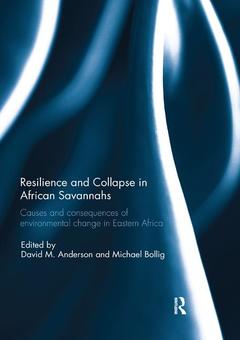Description
Resilience and Collapse in African Savannahs
Causes and consequences of environmental change in east Africa
Coordinators: Bollig Michael, Anderson David M.
Language: English
Subjects for Resilience and Collapse in African Savannahs:
Keywords
East Pokot; Lake Baringo; Journal of Eastern African Studies; Il Chamus; Resilience; Young Men; Historical Ecology; Pastoral Pokot; Eastern Africa; Laikipia Plateau; Identity Politics; Social Ecological System; Conflict and Environment; Adaptive Cycles; Environmental Crisis; Bush Encroachment; David M; Anderson; East African Pastoralists; Matthew I; J; Davies; Kerio Valley; Henrietta L; Moore; Pokot Community; Hauke-Peter Vehrs; Dodonaea Viscosa; Mathias Becker; Baringo District; Miguel Alvarez; Finger Millet; Gereon Heller; Lake Bogoria; Paul Leparmarai; Adaptive Cycle Model; Damaris Maina; Wei Wei; Itambo Malombe; Laikipiak Maasai; Hauke Vehrs; Colonial Administration; Clemens Greiner; North Western Kenya; Innocent Mwaka; Mid-hill Zones; Ivy L; Pike; Archival Residue; Bilinda Straight; Honey Production; Charles Hilton; Spread Dynamics; Matthias Österle; Paul Lane; Musa Letua; Peter D; Little; Gabrielle Lynch
Publication date: 10-2018
· 17.4x24.6 cm · Paperback
Publication date: 02-2017
· 17.4x24.6 cm · Hardback
Description
/li>Contents
/li>Readership
/li>Biography
/li>
This book assesses the causes and consequences of environmental change in East Africa, asking whether local African communities are sufficiently resilient to cope with the ecological and social challenges that confront them. It focuses on the savannahs of the Baringo-Bogoria basin, and the surrounding highlands of Kenya?s northern Rift Valley that form the social-ecological system of the specialised cattle pastoralists and niche agricultural farmers who occupy these semi-arid lands. Historical studies of resilience spanning the past two centuries are linked with analysis of current environmental challenges, and the ecological, social, economic and political responses mounted by local communities. The authors question whether the most recent challenges confronting the peoples of eastern Africa?s savannahs ? intensified conflicts, mounting poverty driven by demographic pressures, and dramatic ecological changes brought by invasive species ? might soon led to a collapse in essential elements of the specialised cattle pastoralism that dominates the region, requiring a re-orientation of the social-ecological system. This book was originally published as a special issue of the Journal of Eastern African Studies.
Introduction: Resilience and collapse: Histories, ecologies, conflicts and identities in the Baringo-Bogoria basin, Kenya Adaptive cycles in the savannah: pastoral specialization and diversification in northern KenyaThe beginning of time? Evidence for catastrophic drought in Baringo in the early nineteenth century Landscape, time and cultural resilience: a brief history of agriculture in Pokot and Marakwet, KenyaChanges in landscape vegetation, forage plant composition and herding structure in the pastoralist livelihoods of East Pokot, Kenya Land use changes and the invasion dynamics of shrubs in Baringo Agricultural change at the margins: adaptation and intensification in a Kenyan dryland Comparative nutritional indicators as markers of resilience: the impacts of low-intensity violence among three pastoral communities of northern Kenya 'Dust people’: Samburu perspectives on disaster, identity, and landscape A victory in theory, a loss in practice: struggles for political representation in the Lake Baringo-Bogoria Basin, Kenya What’s in a name? The politics of identity in the Cherangany Hills, Kenya, Gabrielle Lynch
David M Anderson is Professor of African History in the Global History and Culture Centre, at the University of Warwick, UK. He has published widely on history and politics in Eastern Africa, including Eroding the Commons (2002), The Khat Controversy (2007), Histories of the Hanged (2005) and The Routledge Handbook of African Politics (ed. 2013).
Michael Bollig is Professor of Social and Cultural Anthropology at the University of Cologne, Germany. His recent books include African Pastoralism: Past, Present and Future (2013), Interdisciplinary Perspectives on African Landscapes (2009) and Risk Management in a Hazardous Environment (2006). He is currently researching the political ecology of conversation in Southern Africa and land use changes in dryland East Africa.




